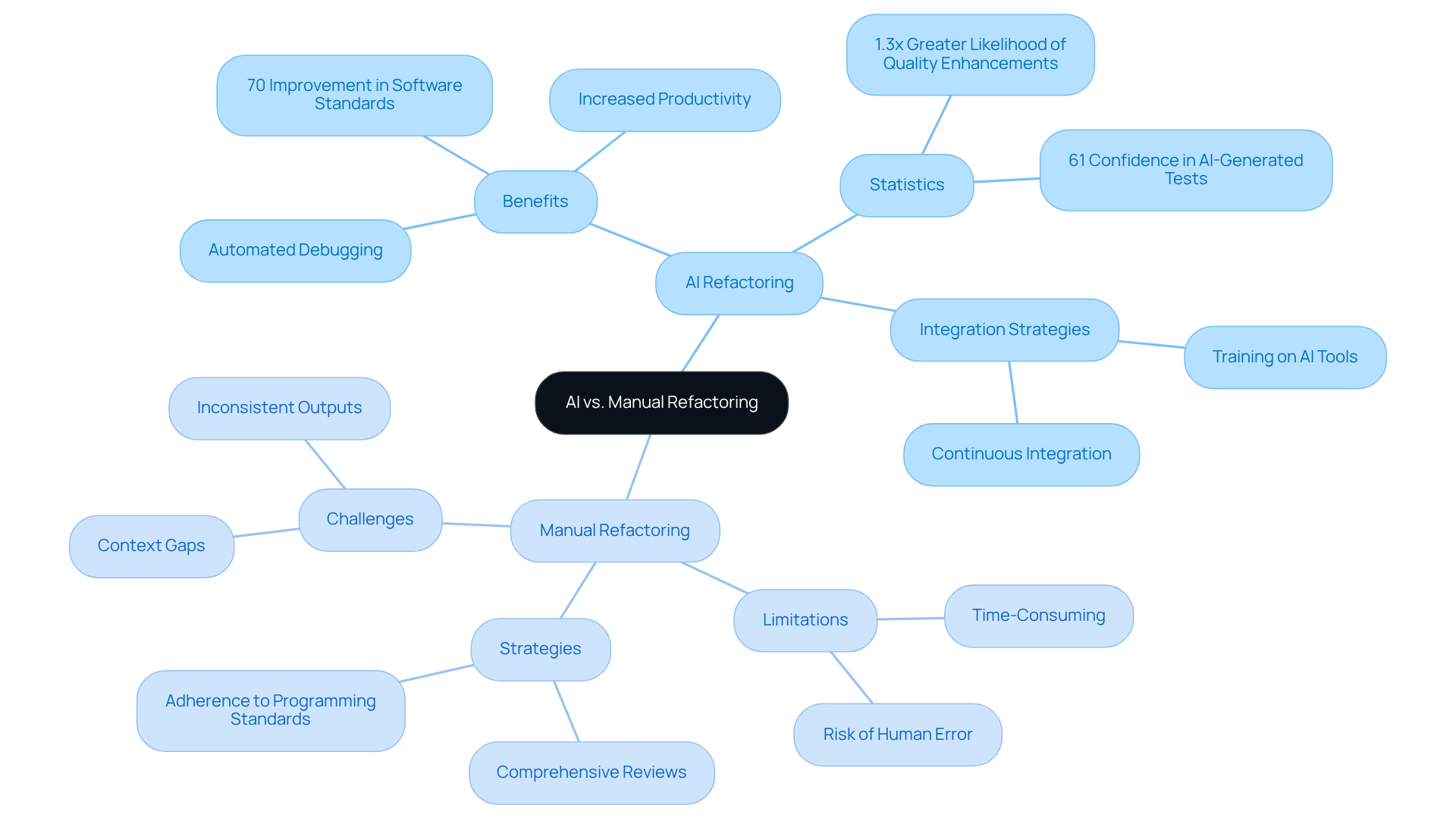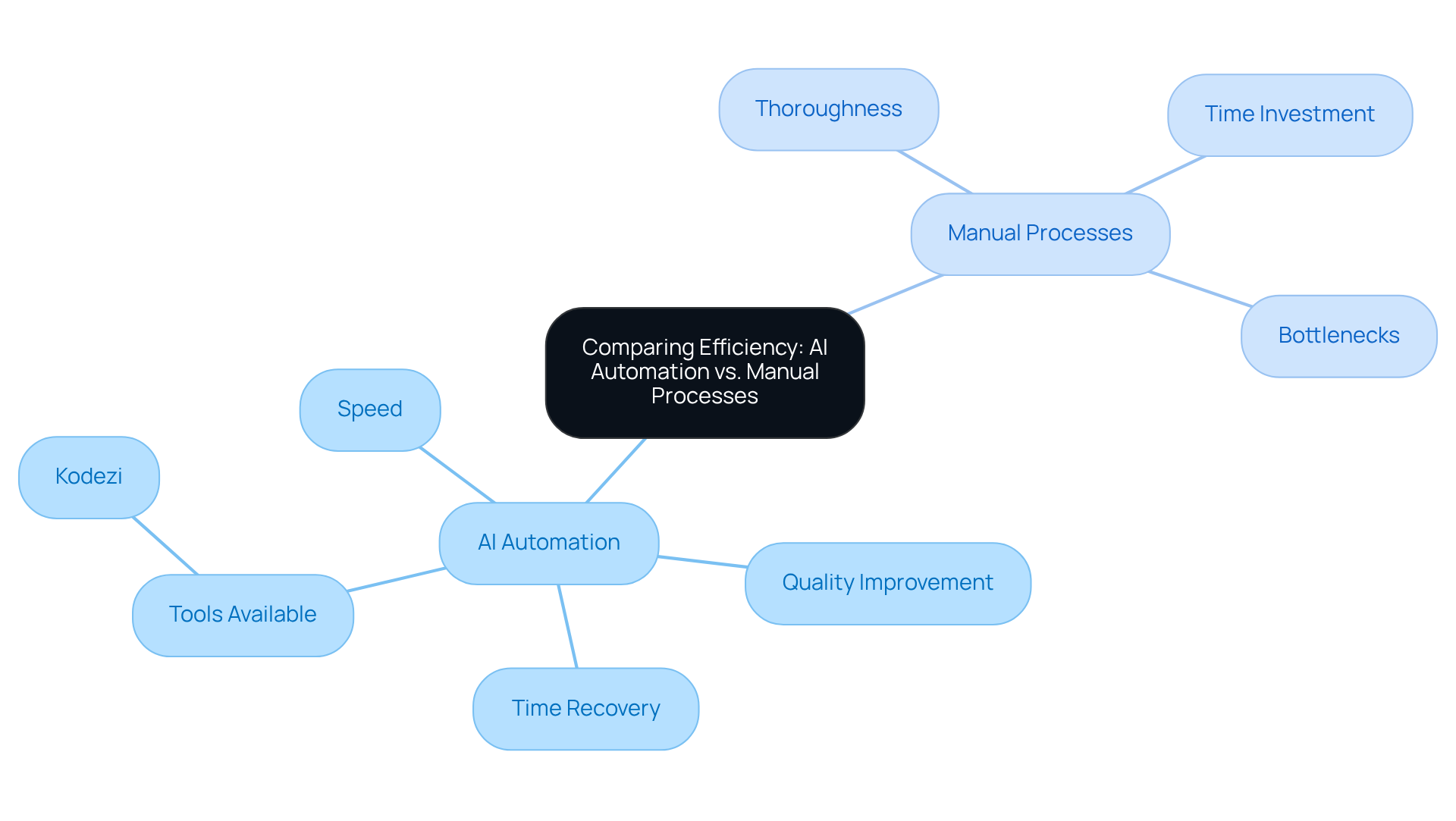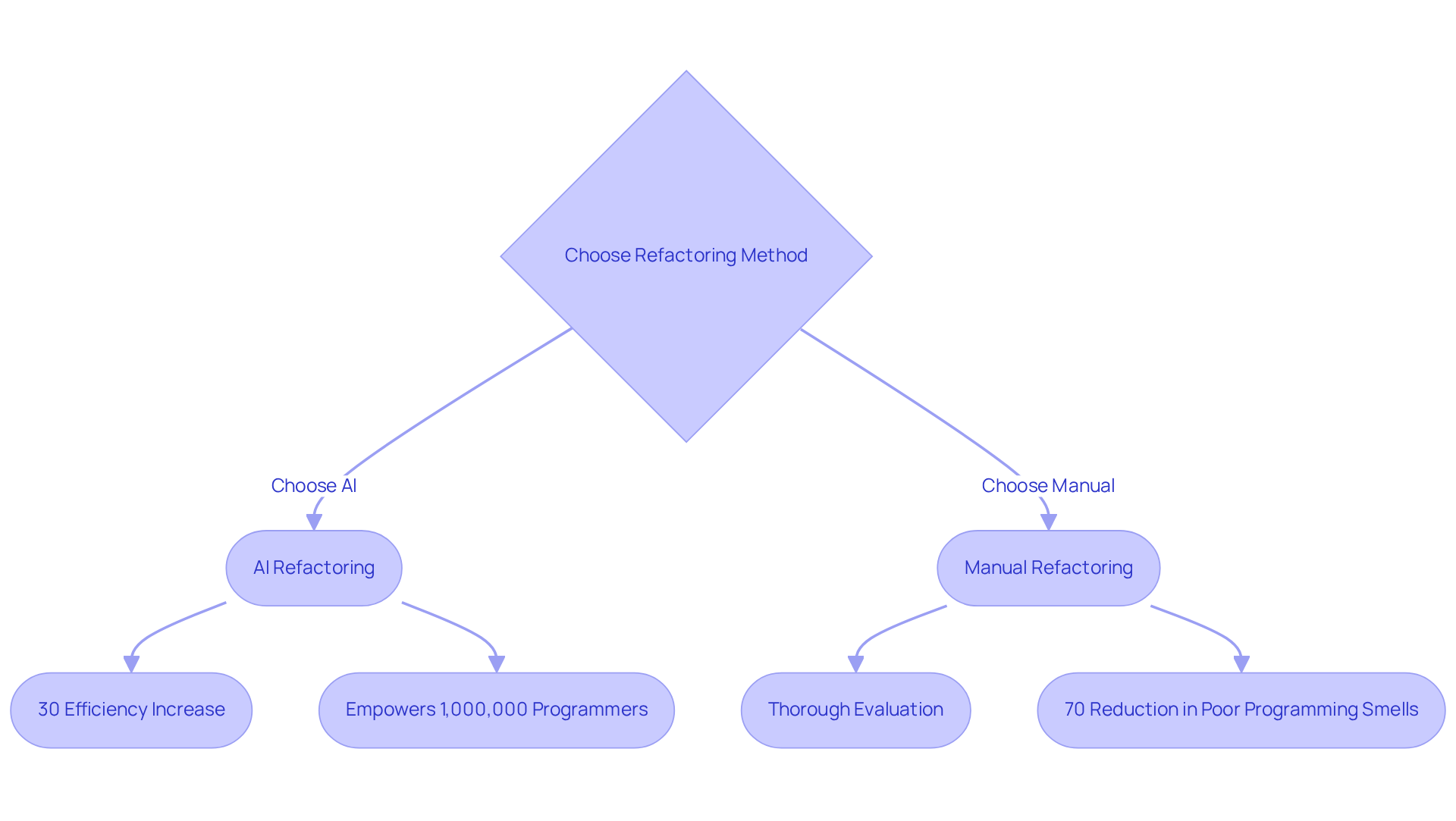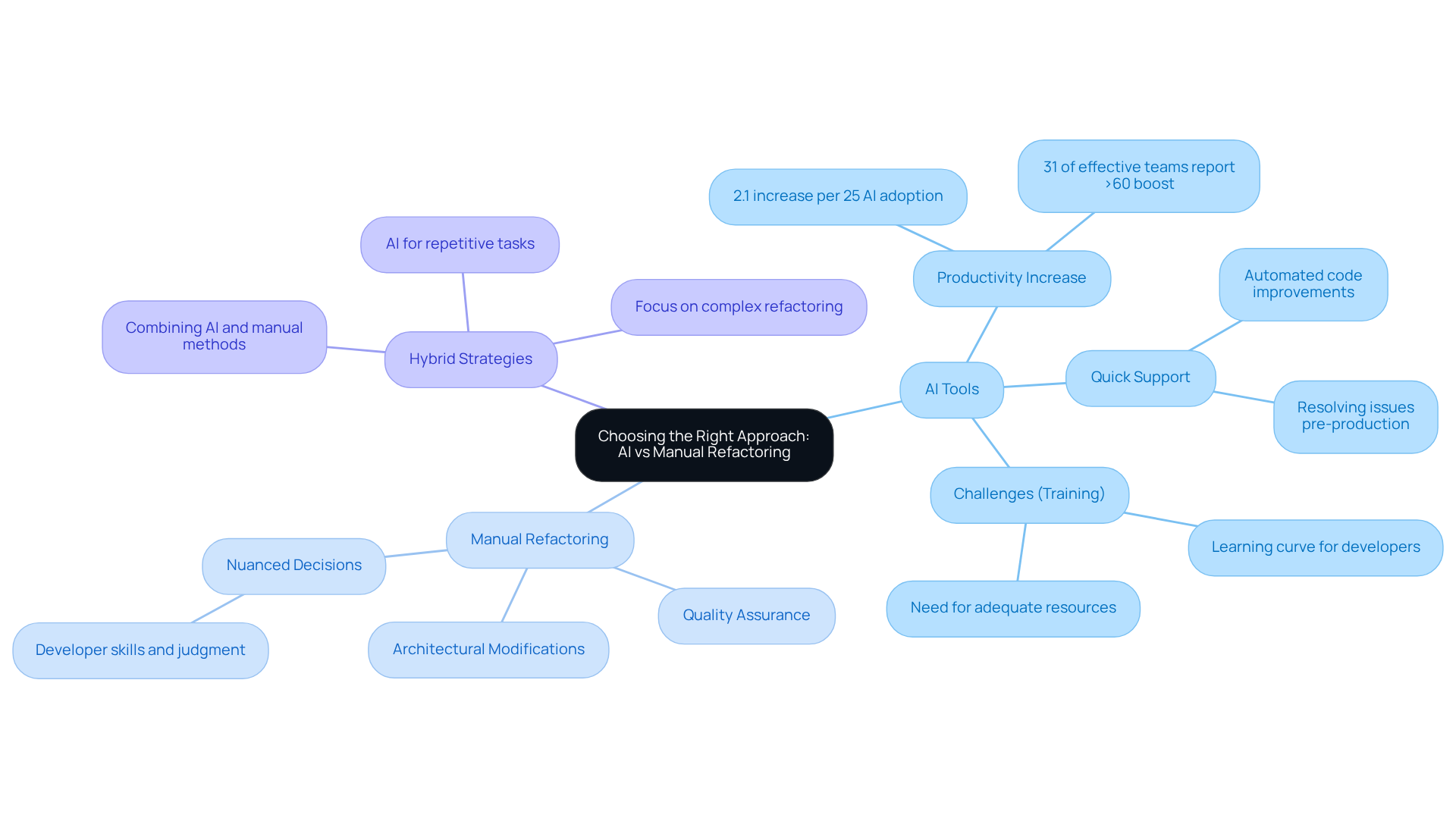Overview
Developers often encounter significant coding challenges that can hinder their productivity. AI code refactoring, particularly through tools like Kodezi, addresses these obstacles effectively. By executing tasks at a speed and scale unattainable by manual methods, Kodezi boosts efficiency and significantly reduces the time spent on routine maintenance. Evidence shows that teams utilizing AI tools like Kodezi experience up to a 70% improvement in software standards and productivity. This allows developers to focus on feature development rather than being bogged down by technical debt.
Furthermore, Kodezi's features enable developers to streamline their workflow, enhancing both code quality and overall project outcomes. Imagine spending less time on tedious tasks and more on innovative solutions. With Kodezi, this is possible. The benefits of improved productivity and code quality are clear, making it an essential tool for modern development practices.
In addition, by leveraging AI capabilities, developers can elevate their coding standards while minimizing errors. Why continue to struggle with manual processes when a more efficient solution is available? Explore the tools offered on Kodezi's platform to transform your coding experience and embrace a future of enhanced productivity.
Introduction
In the fast-paced world of software development, developers frequently face significant challenges related to efficiency and code quality. As they navigate these complexities, AI-driven tools like Kodezi emerge as promising solutions, designed to enhance productivity and streamline coding processes. But can automation truly surpass the nuanced insights provided by human oversight? This article explores the comparative efficiencies of AI code refactoring versus traditional manual methods, examining their potential impacts on the coding landscape in 2025 and beyond.
Furthermore, Kodezi offers specific features that address common pain points, making it an invaluable resource for developers. By leveraging AI capabilities, Kodezi not only aids in refactoring code but also promotes improved code quality and productivity. As teams consider their coding practices, the benefits of utilizing Kodezi become increasingly apparent. Readers are encouraged to explore the tools available on the Kodezi platform to discover how they can transform their development processes.
Understanding AI Code Refactoring and Manual Refactoring
In the realm of software development, coding challenges are a common hurdle that developers must navigate. How can teams overcome these obstacles effectively? Kodezi offers a solution by utilizing advanced artificial intelligence tools to enhance the quality of applications. Its sophisticated algorithms analyze codebases, pinpoint inefficiencies, and implement improvements autonomously, streamlining the debugging process. For instance, Kodezi's automated debugging feature allows teams to quickly identify and rectify issues, providing thorough explanations of what occurred and how it was resolved.
The benefits of using Kodezi are substantial. Teams employing AI tools report a remarkable 70% improvement in software standards and increased productivity, demonstrating that AI can convert speed into lasting excellence. Additionally, developers who leverage AI-generated programming enjoy a 1.3 times greater likelihood of reporting quality enhancements. This trust is crucial, as only 3.8% of developers feel confident in deploying AI-generated content without human oversight, highlighting the necessity for improved contextual understanding in AI tools. Kodezi addresses these context gaps, ensuring seamless integration into workflows and guaranteeing compliance with the latest security best practices.
While AI code refactoring vs manual restructuring has its merits, manual restructuring often faces limitations such as being time-consuming and posing the risk of human error. What strategies can developers employ to optimize manual refactoring in 2025? Comprehensive reviews, adherence to programming standards, and continuous integration are essential to ensure modifications do not create new issues. As software development evolves, integrating AI tools becomes increasingly vital, enabling teams to concentrate on strategic problem-solving rather than routine maintenance tasks.
In the words of Bernard Marr, "AI tools are transforming how we approach software quality, enabling us to uphold high standards while speeding up our workflows with solutions that prioritize both efficiency and security." This statement encapsulates the growing recognition of AI's role in enhancing the efficiency and effectiveness of software development practices. Explore the tools available on Kodezi's platform to transform your coding experience.

Comparing Efficiency: AI Automation vs. Manual Processes
Developers often face significant challenges in managing code quality and efficiency. AI automation significantly enhances efficiency when comparing AI code refactoring vs manual processes by executing refactoring tasks at a speed and scale unattainable by manual methods. For instance, Kodezi can independently identify and resolve bugs, enhance programming, and produce documentation instantly. This capability decreases the duration developers allocate to regular maintenance, allowing them to focus on feature development. Furthermore, this AI-driven programming tool not only rectifies code but also clarifies errors, enabling teams to improve their code quality prior to production.
What if you could boost your efficiency by 40%? Statistics show that AI can achieve just that, while automation recovers approximately 70% of the time spent on manual data entry and CRM management. In contrast, the comparison of AI code refactoring vs manual restructuring shows that while manual methods can be more thorough, they often require substantial time investment and can lead to bottlenecks, especially in larger codebases. Developers may need to pause feature development to address technical debt, which can slow down overall project timelines.
Insights from tech leads indicate that although manual processes may offer deeper insights, they do so at the cost of efficiency. Thus, while AI automation, represented by Kodezi, excels in speed and productivity improvement, it is crucial to acknowledge the challenges of AI code refactoring vs manual code adjustments in managing large codebases. Explore the tools available on the Kodezi platform to enhance your coding practices and experience these efficiency gains.

Evaluating Effectiveness: Quality Outcomes of AI and Manual Refactoring
Coding challenges can often hinder developers' productivity and efficiency. However, AI refactoring tools like Kodezi are designed to tackle these issues head-on. By swiftly identifying and correcting common coding problems, Kodezi significantly enhances programming productivity for B2B engineering teams. User testimonials reveal that Kodezi has empowered over 1,000,000 programmers to find and fix bugs more quickly and easily than traditional methods, proving to be a lifesaver for debugging tasks.
While AI offers rapid improvements, with a reported efficiency increase of 30% when integrated into assurance procedures, manual restructuring provides a more thorough evaluation of software standards. This allows developers to consider the broader implications of their modifications. Nonetheless, manual methods are not without challenges; human error can lead to oversights, particularly concerning less obvious issues. Statistics indicate that the rate of human mistakes in manual restructuring can be significant. Studies show that problems arising from multi-programming-language commits (MPLCs) take longer to resolve in 89% of projects, contributing to increased development difficulties and diminished software quality, as noted by Zengyang Li.
Empirical research highlights the advantages of manual restructuring, demonstrating significant improvements in design and a reduction in poor programming smells by as much as 70%. Additionally, the percentage of modified code lines associated with restructuring has decreased notably, dropping from 25% in 2021 to under 10% in 2024. This shift suggests a transformation in coding practices. Ultimately, the choice between AI code refactoring vs manual methods may hinge on the specific needs of a project, weighing speed and efficiency against thorough analysis and quality assurance. Kodezi's autonomous capabilities establish it as a versatile tool for teams seeking to auto-heal their codebases and elevate their overall programming experience.

Choosing the Right Approach: When to Use AI or Manual Refactoring
Selecting the appropriate method between AI and manual revision hinges on various essential factors, such as project size, team expertise, and specific objectives. Are you facing tight deadlines or managing large codebases? AI enhancement tools like Kodezi CLI can offer quick support by autonomously improving software standards and resolving issues before they reach production. Statistics reveal that teams leveraging AI tools see a productivity increase of approximately 2.1% for every 25% rise in AI adoption. Notably, 31% of highly effective software teams have reported productivity boosts exceeding 60% through AI adoption, highlighting the significant efficiency gains these technologies can deliver.
Conversely, in scenarios demanding substantial architectural modifications or where software quality is paramount, manual revision may prove more advantageous. This approach allows developers to apply their skills and judgment, ensuring nuanced decisions are made regarding structure and maintainability. Furthermore, the learning curve associated with adopting AI tools can present challenges for some developers, necessitating adequate training and resources to fully harness the benefits of AI integration.
In addition, hybrid strategies can effectively merge the strengths of both methods. In such cases, AI tools like Kodezi CLI can handle repetitive tasks, enabling developers to focus on more complex refactoring efforts. However, it is crucial to remain aware of the potential increase in bugs due to AI-generated programming, particularly when working with incomplete requirements or legacy systems. This balance not only enhances efficiency but also safeguards the quality of the codebase, making it an appealing option for modern engineering teams. Including insights from project managers on best practices for code refactoring can further enrich this discussion.

Conclusion
The exploration of AI code refactoring versus manual methods reveals a transformative shift in software development efficiency and quality. Developers often face significant challenges with traditional manual refactoring approaches. However, the integration of AI tools like Kodezi addresses these challenges effectively. By automating routine tasks, Kodezi not only alleviates the burden on developers but also ensures that code quality is maintained at a high standard, allowing teams to focus on more complex challenges.
Key insights from the article highlight the stark contrast in efficiency between AI and manual refactoring. AI tools can achieve remarkable time savings and quality improvements. Statistics indicate that teams using AI report productivity increases of up to 60%. Conversely, while manual methods may be more thorough, they often lead to bottlenecks and increased risks of human error. The balance between these approaches ultimately depends on project requirements, team expertise, and specific goals, underscoring the need for a thoughtful selection process.
As the landscape of software development continues to evolve, embracing AI technologies presents a compelling opportunity for teams to enhance their coding practices. The integration of AI not only streamlines workflows but also fosters an environment where developers can prioritize innovation over routine maintenance. Adopting a hybrid approach that leverages the strengths of both AI and manual refactoring could prove to be the most effective strategy moving forward. This ensures that quality and efficiency remain paramount in the ever-competitive tech industry.
Frequently Asked Questions
What is Kodezi and how does it assist in software development?
Kodezi is an advanced artificial intelligence tool that enhances the quality of applications by analyzing codebases, pinpointing inefficiencies, and implementing improvements autonomously, thereby streamlining the debugging process.
What are the benefits of using Kodezi for code refactoring?
Teams using Kodezi report a 70% improvement in software standards and increased productivity. Developers leveraging AI-generated programming are 1.3 times more likely to report quality enhancements.
How does Kodezi improve the debugging process?
Kodezi's automated debugging feature enables teams to quickly identify and rectify issues, providing thorough explanations of what occurred and how it was resolved.
What challenges do developers face with manual refactoring?
Manual restructuring can be time-consuming and poses the risk of human error, making it less efficient compared to AI-assisted methods.
What strategies can developers employ to optimize manual refactoring?
Developers can optimize manual refactoring by conducting comprehensive reviews, adhering to programming standards, and implementing continuous integration to ensure modifications do not introduce new issues.
What is the significance of trust in AI-generated content among developers?
Only 3.8% of developers feel confident deploying AI-generated content without human oversight, indicating a need for improved contextual understanding in AI tools.
How does Kodezi address the gaps in AI contextual understanding?
Kodezi ensures seamless integration into workflows and guarantees compliance with the latest security best practices, addressing the context gaps that developers face.
What is the future outlook for AI tools in software development?
As software development evolves, integrating AI tools like Kodezi becomes increasingly vital, allowing teams to focus on strategic problem-solving rather than routine maintenance tasks.




